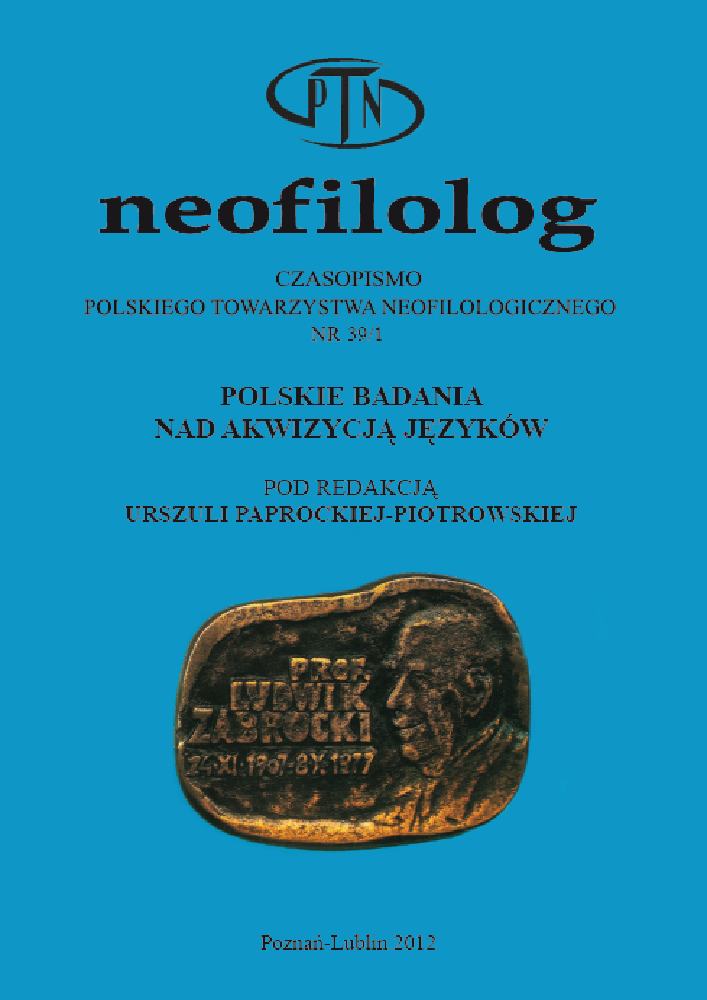Abstract
In the article I am presenting the course of the process of learning vocabulary activated while teaching a foreign language. The paper takes the models of information processing and input processing as a starting point to describe the phases of vocabulary learning and to implicate the teaching procedures based on the insights in the natural processes of language acquisition. It provides theoretical background referring to the concept of instructed learning understood as the possibility of steering learners’ perception and processing of lexical structures by the teacher, and also examples on how to use this knowledge in the classroom.
References
Butzkamm, W. 1993. Psycholinguistik des Fremdsprachenunterrichts: natürliche Künstlichkeit von der Muttersprache zur Fremdsprache. Tübingen: Francke.
De Florio-Hansen, I. 1991. „FSU und ZSE. Ein Vergleich der Sprachaufnahmeprobleme”. Praxis des neusprachlichen Unterrichts 4/1991: 339-345.
Engelkamp. J. 1985. „Die Repräsentationen der Wortbedeutung” (w) Handbuch der Lexikologie (red. Ch. Schwarze, D. Wundrlich) Königsstein/TS: Athenäum: 292-313.
Gass, S. M. 1997. Input, Interaction and the Second Language Learner. Mahwah, New Jersey: Lawrence Erlbaum Associates.
Huneke, H.-W., Steinig, W. 2002. Deutsch als Fremdsprache: eine Einführung. Berlin: Erich Schmidt.
Kesseler, H.J. 2004 Didaktische Strategien beim Wissenstransfer im Spannungsfeld von Bildungsdidaktischen und kommunikationswissenschaftlichen Ansprüchen. www.edoc.ub.uni-muenchen.de/archive/00003246/01/Kesseler_Hansjoachim.pdf DW 12.05.2006.
Komorowska, H. 2002. Metodyka nauczania języków obcych. Warszawa: Fraszka Edukacyjna.
Krashen, S. 1985. The Input Hypothesis: Issues and implications. London,New York: Longman.
Lewicka, G. 2007. Glottodydaktyczne aspekty akwizycji języka drugiego a konstruktywistyczna teoria uczenia się. Wrocław: Oficyna Wydawnicza Atut – Wrocławskie Wydawnictwo Oświatowe.
Pfeiffer, W. 1986. „Wissenschaftliche Grundlagen der Fremdsprachendidaktik”. Deustch als Fremdsprache IV: 215-219.
Raczyńska, M. 2007. „Kompetencje lingwistyczne, socjolingwistyczne, pragmatyczne i funkcjonalne w uczeniu się i nauczaniu języka według standardów Europejskiego Systemu Opisu Kształcenia Językowego” (w) Materiały z IV Międzynarodowej Konferencji Edukacyjnej „Przez Języki Obce do Sukcesu”, Ustroń: 169-175.
Sadownik, B. 1981. Implikationen der Zweitsprachenerwerbsforschung. Lublin: Wydawnictwo UMCS.
Scherfer, P. 1988. „Überlegungen zum Wortschatzlernen im Fremdspracheunterricht” (w) Aspekte des Lernens und Lehrens von Fremdsprachen (red. A. Rasch, M. Bludau, F. J. Zapp) Frankfurt nad Menem: Moritz Diesterweg Verlag: 28-51.
Schmidt, G. 1986. „Fremdsprachlicher Unterricht mit mehr Motivation – Übertragung didaktischer Teilkompetenzen auf den Schüler bei der Methode von Jean-Pol Martin”. Die Bayerische Realschule 11/86: 16-20.
Sharwood Smith, M. 1994. Second Language Learning: Theoretical Foundations. Longmann.
Szczordowski, M. 2000. „Glottokodematyka i jej zakresy badawcze” (w) Problemy komunikacji międzykulturowej. Lingwistyka, translatoryka, glottodydaktyka (red. B. Kielar, T. Krzeszowski, J. Lukszyn, T. Namowicz). Warszawa: Graf Punkt: 428-450.
Vogel, K. 1989. Aspekte der Lernersprache als Forschungskonzept des Zweitsprachenerwerbs. Göttingen Wilczyńska, W., Michońska-Stadnik, A. 2010. Metodologia badań w glottodydaktyce. Wprowadzenie. Kraków: Avalon/Flair.
Wode, H. 1993. Psycholinguistik: eine Einführung in die Lehr- und Lernbarkeit von Sprachen. Ismaning: Hueber.
License
Copyright (c) 2012 Agnieszka Kubiczek

This work is licensed under a Creative Commons Attribution-NoDerivatives 4.0 International License.
Authors
Authors of texts accepted for publication in Neofilolog are required to complete, sign and return to the Editorial team’s office the Agreement for granting a royalty-free license to works with a commitment to grant a CC sub-license.
Under the agreement, the authors of the texts published in Neofilolog grant Adam Mickiewicz University in Poznań a non-exclusive, royalty-free license and authorize the use of Attribution-NoDerivatives 4.0 International (CC BY-ND 4.0) Creative Commons sub-license.
The authors retain the right to the free disposal of the work.
Users
Interested Internet users are entitled to use works that have been published in Neofilolog since 2017, under the following conditions:
▪ attribution – obligation to provide, together with the distributed work, information about the authorship, title, source (link to the original work, DOI) and the license itself.
▪ no derivatives – the work must be preserved in its original form. Without the author's consent, it is not possible to distribute the modified work in the form of translations, publications, etc.
Copyrights are reserved for all texts published since 2017.
Miscellaneous
Adam Mickiewicz University in Poznań retains the property right as a whole (layout, graphic form, title, cover design, logo etc.).
